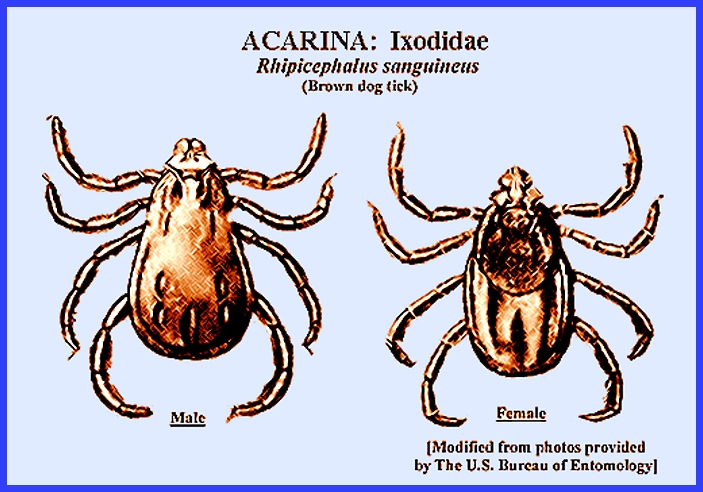File: <boutonneusefever.htm> <Medical Index> <General Index> Site Description Glossary <Navigate
to Home>
|
BOUTONNEUSE FEVER (Alternate Name = Mediterranean Spotted Fever) (Contact) Please
CLICK on
image & underlined links for details: Service
(2008) reported that both transstadial and transovarial transmission
occurs. Reservoir hosts include dogs
and ticks. Crushing an infected tick
near an abrasion or the eyes can also transmit the Rickettsia. = = = = = = = = = = = =
= = = = = = = = Key References: <medvet.ref.htm> <Hexapoda> Camicas, J. L., J. . Hervy, F. Adam & P. C.
Morel. 1998. The ticks of the world (Acarida,
Ixodida): Nomenclature, Described
Stages, Hosts, Distribution. Paris: Editions de
l'ORSTOM. Gammons, M. & G.
Salam. 2002. Tick removal. Amer. Fam. Physician 66:
643-45. Hoogstraal, H. 1966.
Ticks in relation to human diseases caused by viruses. Ann. Rev. Ent. 11: 261-308. Hoogstraal, H. 1967.
Ticks in relation to human diseases caused by Rickettsia species. Ann. Rev. Ent. 12: 377-420. Matheson, R. 1950. Medical Entomology. Comstock Publ. Co, Inc. 610 p. Parola, P. & D. Raoult. 2001.
Tick-borne typhuses. IN: The Encyclopedia of arthropod-transmitted
Infections of Man and Domesticated Animals. ed. M. W. Service, Wallingford:
CABI: pp. 516-24. Service, M. 2008.
Medical Entomology For Students.
Cambridge Univ. Press. 289 p Legner, E. F. 1995. Biological control of Diptera of medical and veterinary
importance. J. Vector Ecology 20(1):
59_120. Legner, E. F. 2000.
Biological control of aquatic Diptera. p. 847_870.
Contributions to a Manual of Palaearctic Diptera, Vol. 1, Science Herald, Budapest. 978 p. Sonenshine, D. E. &
T. N. Mather (eds.) 1994. Ecological Dynamics of Tick-Borne
Zoonoses. Oxford Univ. Press, New
York. Steer, A., J. Coburn & L. Glickstein. 2005.
Lyme borreliosis. IN: Tick-Borne Diseases of Humans, ed. J. L.
Goodman, D. T. Dennis & D. E. Sonenshine. Washington, DC: ASM Press |
